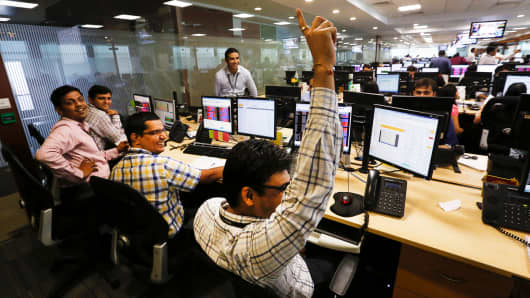A recent shock defeat by India's
leading, reform-minded party may make some investors nervous, but
experts say it's unlikely to derail liberalization of the Indian
economy—and the country's real challenges lie elsewhere, anyway.
Since the election of Narendra Modi
as prime minister in May 2014, Indian stock market investors have
cheered Modi's relatively liberal economic policies, pushing the
benchmark BSE Sensex up 30 percent since the election and 5.4 percent so
far this year.
That optimism blanched a bit this month, when Modi's party was thrashed in state elections in Delhi by Arvind Kejriwal and his upstart AAP party, raising
fears that Modi will lose the political leverage he needs to carry through with his economic, regulatory and fiscal goals.
Experts who spoke to CNBC said the election won't stop Modi or his reforms, but he still faces big challenges.
Read MoreOil briefly turns positive on OPEC meeting report
Improved foreign investment or the country's new "Make in India" campaign—part of an effort to transform India into a manufacturing hub—are barely affected by the Delhi vote, said Anubhav Gupta, senior program advisor for the Asian Society Policy Institute. What's really needed is a clear policy framework, which some hope Modi will define in the upcoming fiscal 2015 budget draft, due Feb. 28.
"[Modi's] economic agenda was fairly abstract during the election campaign," Gupta said. "We didn't get a lot of economic reform agenda we were told he would focus on and the budget that came out last year was disappointing."
Alyssa Ayres, senior fellow for India, Pakistan and South Asia at the Council on Foreign Relations, said she does not see the Delhi defeat as a hindrance to Modi's economic vision, because proposals from newly elected Delhi Chief Minister Kejriwal—for half-priced electricity and free water—are mostly populist in nature and likely to run into problems.
That optimism blanched a bit this month, when Modi's party was thrashed in state elections in Delhi by Arvind Kejriwal and his upstart AAP party, raising
fears that Modi will lose the political leverage he needs to carry through with his economic, regulatory and fiscal goals.
Experts who spoke to CNBC said the election won't stop Modi or his reforms, but he still faces big challenges.
Read MoreOil briefly turns positive on OPEC meeting report
Improved foreign investment or the country's new "Make in India" campaign—part of an effort to transform India into a manufacturing hub—are barely affected by the Delhi vote, said Anubhav Gupta, senior program advisor for the Asian Society Policy Institute. What's really needed is a clear policy framework, which some hope Modi will define in the upcoming fiscal 2015 budget draft, due Feb. 28.
"[Modi's] economic agenda was fairly abstract during the election campaign," Gupta said. "We didn't get a lot of economic reform agenda we were told he would focus on and the budget that came out last year was disappointing."
Alyssa Ayres, senior fellow for India, Pakistan and South Asia at the Council on Foreign Relations, said she does not see the Delhi defeat as a hindrance to Modi's economic vision, because proposals from newly elected Delhi Chief Minister Kejriwal—for half-priced electricity and free water—are mostly populist in nature and likely to run into problems.
As far as growth-seeking global investors are concerned,
Roy Kamphausen, senior advisor at the National Bureau of Asian Research,
said Modi's India has shown a great deal of initiative with
international partnerships. But Modi's biggest challenge lies in
overcoming internal bureaucracy, rather than worrying about Kejriwal or
his AAP party.
"I think international partners take Mr. Modi at his word, as an ambitious, trustworthy energetic leader," Kamphausen said. "They sense that he is saying exactly what he is going to accomplish, but he faces an enormous uphill battle in dealing with his own bureaucracy—the part everyone senses is going to be a challenge."
Read MoreEuropean shale dream is dying before it started
Jonah Blank, senior political scientist at Rand Corp., said businesses and investors in the United States should actually be heartened by the Delhi election, since it could mean an end to the city's endemic corruption. Kejriwal ran on an anti-corruption platform.
"The only investors who should be threatened are those who have benefited from corrupt practices," he said, "and those are the kind of investors India shouldn't rely on anyway."
Another major component of Modi's economic agenda is a uniform tax policy, something economists and others have called for in a country where currently only about 3 percent of the population pays income tax. While Kejriwal claims to agree with the simplification of India's tax policy, Gupta said implementation is difficult, no matter who stays in power.
"The challenge is harmonizing the tax policy in India," he said. "The election in Delhi doesn't really change that because it has always been an issue that's far bigger than Delhi itself and involves a lot of states in the country."
"I think international partners take Mr. Modi at his word, as an ambitious, trustworthy energetic leader," Kamphausen said. "They sense that he is saying exactly what he is going to accomplish, but he faces an enormous uphill battle in dealing with his own bureaucracy—the part everyone senses is going to be a challenge."
Read MoreEuropean shale dream is dying before it started
Jonah Blank, senior political scientist at Rand Corp., said businesses and investors in the United States should actually be heartened by the Delhi election, since it could mean an end to the city's endemic corruption. Kejriwal ran on an anti-corruption platform.
"The only investors who should be threatened are those who have benefited from corrupt practices," he said, "and those are the kind of investors India shouldn't rely on anyway."
Another major component of Modi's economic agenda is a uniform tax policy, something economists and others have called for in a country where currently only about 3 percent of the population pays income tax. While Kejriwal claims to agree with the simplification of India's tax policy, Gupta said implementation is difficult, no matter who stays in power.
"The challenge is harmonizing the tax policy in India," he said. "The election in Delhi doesn't really change that because it has always been an issue that's far bigger than Delhi itself and involves a lot of states in the country."
"People don't like the old way of doing things. So whichever party comes up with a true way to break from the past will indeed do well for the future."
As for the BJP party's defeat turning into a trend in
other states like Bihar and West Bengal that are soon to hold their own
elections, Blank said the Delhi results are likely to serve as a wake-up
call for Modi and his BJP to buckle down and deliver on economic
growth.
India is expected to show 6 percent GDP growth in 2015, according to the International Monetary Fund, down from 7.4 percent in 2014.
"The most important things about these victories is that the parties tapped into a deep, deep desire in the Indian electorate," Blank said. "It doesn't matter whether it's (the formerly ruling Congress party) or BJP or AAP, people don't like the old way of doing things. So whichever party comes up with a true way to break from the past will indeed do well for the future."
India is expected to show 6 percent GDP growth in 2015, according to the International Monetary Fund, down from 7.4 percent in 2014.
"The most important things about these victories is that the parties tapped into a deep, deep desire in the Indian electorate," Blank said. "It doesn't matter whether it's (the formerly ruling Congress party) or BJP or AAP, people don't like the old way of doing things. So whichever party comes up with a true way to break from the past will indeed do well for the future."



No comments:
Post a Comment